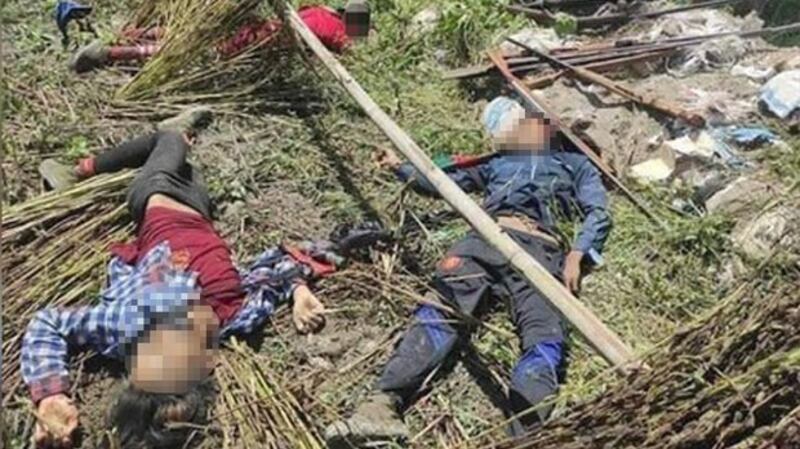Myanmar military forces killed at least 24 civilians in attacks this month on three villages in the country’s central Magway region, murdering eight after taking them alive as prisoners, sources in the region said, with rights groups calling the killings war crimes.
Those killed in the assaults Sept. 9 and 10 on Myin-thar, Mway Le, and Yay Shin villages in Gangaw township included elderly men in their 70s and high school students under the age of 18, family members and resistance fighters told RFA.
Gyo Byu, a member of the local People’s Defense Force unit set up to fight government troops in the wake of the Feb. 1 military coup that overthrew the elected government, said the elderly men who were killed were found tied to chairs and shot in the head, while the young men were shot dead after being captured.
Gyo Byu had helped to bury the bodies after they were found, he said.
One resident of Myin-thar, where 19 were killed on Sept. 9 alone, said that her 15-year-old brother and other high school students were among those killed in the massacre.
"My brother was not even 16 yet. He had just finished the 8th grade," the woman said, adding that some of the other young boys who were killed had recently graduated from 10th grade, some passing their classes with honors.
“The kids had formed a local security force because we had heard the soldiers set fire to houses when they leave a village.”
“It was raining hard when the armed clash took place, and their Tumee hunting rifles didn’t fire, and that’s why our young heroes had to give up their lives,” she said, referring to the antique rifles now used by villagers desperate to defend themselves against government forces.
“We can’t even flee our homes in peace, since we can’t go back to recover their bodies. When the mothers return, they won’t be able to find their sons,” she said.
Ten of those killed in Myin-thar on Sept. 9 were found lying in a group in a nearby field, one villager said, speaking to RFA like other villagers on condition of anonymity for security reasons.
“At least 11 houses were set on fire that day, and 19 people were killed, a few of them during the initial shelling in the attack,” the source said. “Ten bodies were later found in a group in the sesame fields. The rest died near their homes.”
“Witnesses said that two or three of these died right away, and that when the rest turned back to get them they were arrested by the soldiers, and it seems they were then shot at close range. It was very gruesome,” he said.
Three more people from Myin-thar and Mway Le village were killed that day, and on Sept. 10 two residents of Yay Shin village were also killed, making a total of 24 civilians killed during the two days of attacks.
Sources have told RFA that Myanmar troops have repeatedly raided villages in the Magway region since the beginning of September, destroying homes and arresting and killing villagers. Young people are often accused of being dissidents or People’s Defense Force members, and are sometimes tortured and killed under questioning.
Elderly villagers are also not spared, residents say.
Calls seeking comment from Myanmar military spokesman Zaw Min Tun received no replies this week.

'Unacceptable anywhere'
The killings of civilians reported in Magway should be considered war crimes, said Aung Myo Min, Minister for Human Rights in the shadow National Unity Government (NUG) set up in opposition to rule by the military.
“Any crime against civilians is a crime under the law and a violation of human rights,” Aung Myo Min said. “These people were not killed while fighting or running. They were tortured and killed, and some were shot in the head.”
Another victim was found killed after his genitals were mutilated, he said.
“These were not casualties of war but intentional atrocities—which are unacceptable anywhere, and for anyone.”
Kyee Myint, a veteran Myanmar lawyer, said that the killing of civilians and captives taken in battle by Myanmar forces in Magway and other parts of the country should be reported to the UN Commission on Human Rights.
“Prisoners of war should not be killed,” he said.
“These incidents are happening now because opposition groups are only speaking big words and are unable to provide any assistance—material or financial—or to protect the young people who are taking up arms on their behalf,” he said.
Myanmar’s People’s Defense Forces do not constitute formed armies, said Brad Adams, Asia director at New York-based Human Rights Watch. “So we do not see these [killings] as war crimes. Instead, we see them as human rights abuses.”
“Some people seem to think that a war crime is worse than an extrajudicial killing. It’s not any worse, it’s just a term that people recognize,” he said.
War crimes take place in situations of armed conflict, though, said Matthew Smith of the rights group Fortify Rights.
“[These] allegations of torture or murder are consistent with what we’ve documented in the military crackdown since Feb. 1, and they’re also consistent with the military’s longstanding behavior in the areas of armed conflict for many, many years.”
“It’s the military’s ongoing impunity that allows these types of atrocities to continue,” he said.
In the seven months since the Feb. 1 coup, security forces have killed 1,108 civilians and arrested at least 6,591, according to the Bangkok-based Assistance Association for Political Prisoners (AAPP)—many during crackdowns on anti-junta protests.
Reported by RFA’s Myanmar Service. Translated by Kyaw Min Htun. Written in English by Richard Finney.
